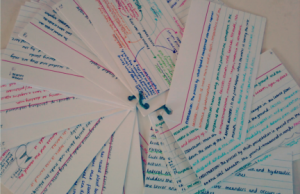
July 27, 2015, by studentcontributor
Re-learning to revise (Part 2)
(Continued from Part 1)
Mind maps/spider diagrams
Ideal for the student who thoroughly understands and remembers concepts. Sometimes a prompt is all that is needed and leads to a “word association”. This gets you out of the rote learning trap and probably makes for more ingrained knowledge which is necessary to become a good doctor. I personally feel this is a great secondary revision technique i.e. after notes or extensive reading, otherwise you may not understand the connections you have drawn
 Flashcards and games
Flashcards and games
Making flashcards works on so many levels. Not only are you learning by writing out your notes into digestible amounts, your revision is portable and you can do it in groups or individually. While time consuming I don’t feel it’s any more so than writing out block notes. To be even more effective, you can separate your flashcards into the ones you confidently know and get correct and recycle the ones you guess, are unsure of or get wrong. You can release your inner child by turning it into a game as well, which works for groups. Variations of “Just a Minute” or “Taboo” I’ve found to be good for certain topics. Don’t be put off by the “game” label; learning is learning and I’ve found these methods to be beneficial whether you are the one flustering to explain something or if you are frantically guessing.
or “Taboo” I’ve found to be good for certain topics. Don’t be put off by the “game” label; learning is learning and I’ve found these methods to be beneficial whether you are the one flustering to explain something or if you are frantically guessing.
Multiple choice questions
Many exams in medicine (during medical school and beyond) are MCQs or extended matching questions (e.g. drop down box matching disease to clinical scenario). I’ve previously been reluctant to use this technique before I’ve learned all my content as I never saw the value in getting 3/100 however whether you are getting questions right or wrong, you are forced to think, deduce and reason, which is effective in itself. Also if you do a set of questions every now and again, it’s nice to see the progression in both confidence and score! Often websites which cater to medicine have explanations for why the options are right and wrong. I would certainly recommend using questions for the latter years of medical school as so much is based on limited scenarios and recognising a clinical picture – a patient will not turn up to A+E with a textbook list of symptoms and family history.
If you know what works for you, then by all means, stick to that. 18 years in education and I’m still not 100% sure. My advice would be that different topics are best learned differently and sometimes a change of routine is what is needed to be effective. It’s easy to just want to study to pass exams and while that is of most immediate importance you want to be the best clinician you can and that comes by learning thoroughly through whatever technique, be it book-reading, note-writing or teaching others. You will certainly forget things but the things I remember most clearly and can explain the best are those I revised efficiently and certainly not what I crammed.
Ebo Dadey
Final year medical student
No comments yet, fill out a comment to be the first

Leave a Reply